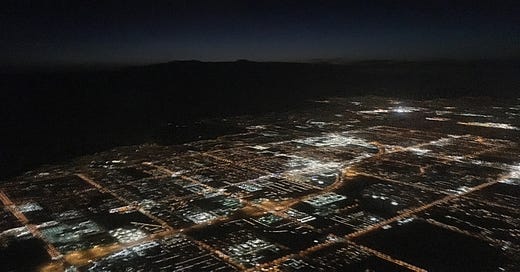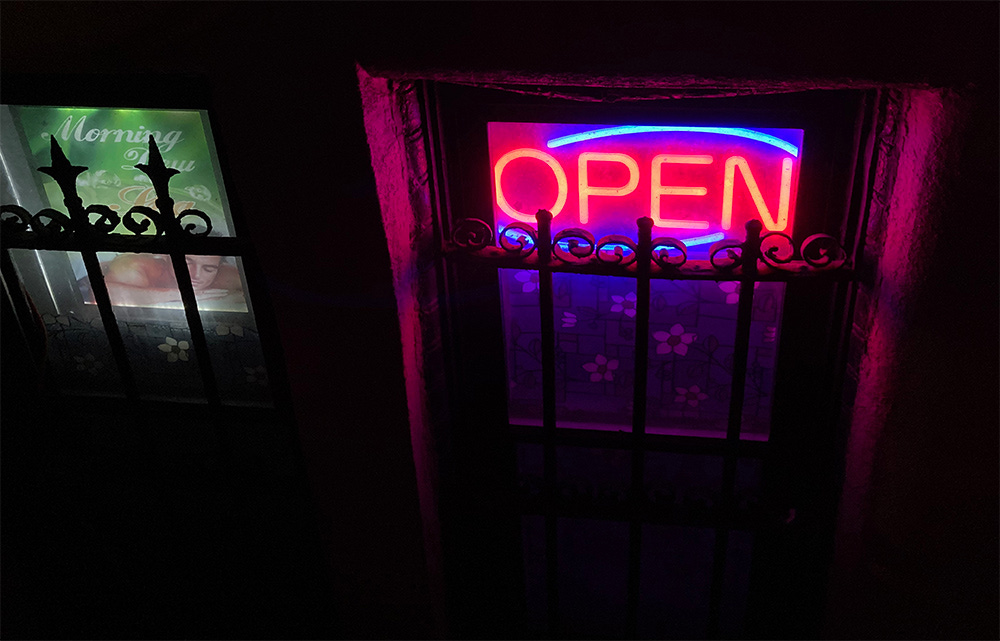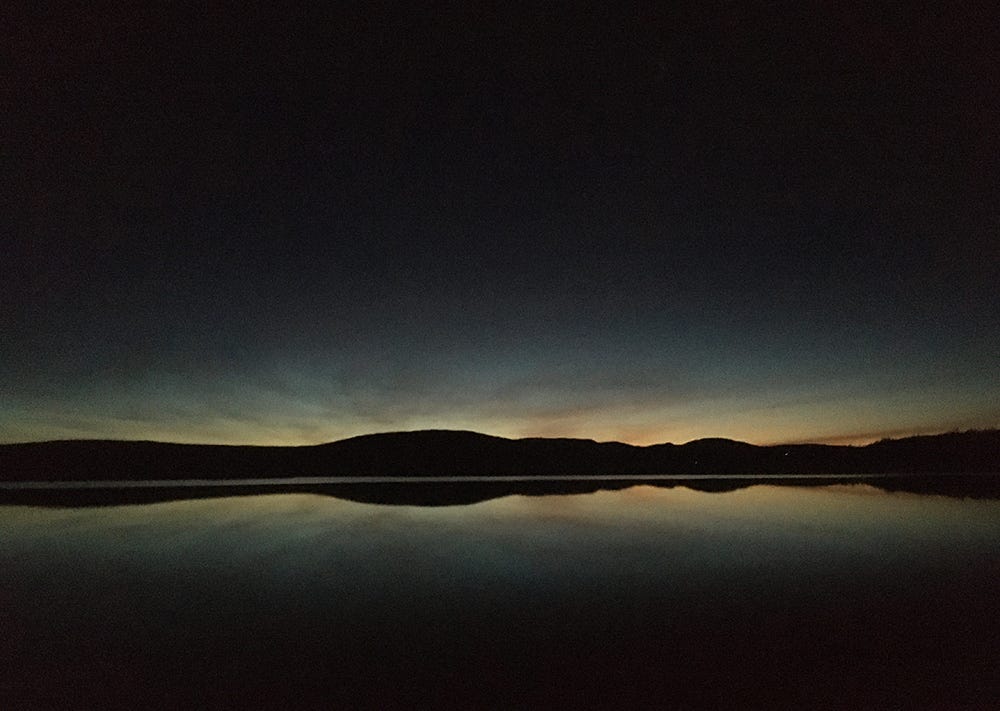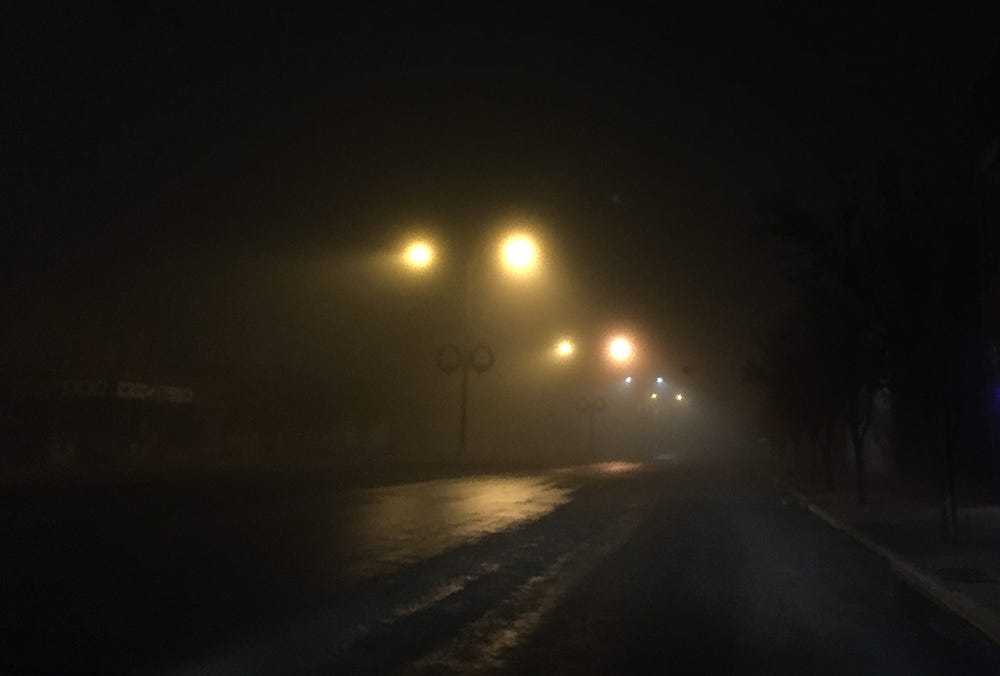The Dreams of Divorcing Women
I drove away from that house, night after night. I knew I could drive away again.
I have been thinking about flying dreams again.
In the summer of 2021, a few months before my life exploded, I had a conversation with my Mom about flying dreams. She asked me about them. Or actually she asked me if I had had one recently, as if it’s a kind of dream that people have on a normal, recurring basis. I considered her question for a few moments while I pulled a jacket out of my overnight bag.
It was August. She and my sister and I were in a hotel room in San Francisco, where even a sunny morning requires a jacket. I was visiting that week from Kansas. My sister, who had moved to California for a few years, was preparing to move back to our hometown in South Dakota. And my mom was so excited by the rare fact of the three of us being in one place that she sprung for a night at a hotel near the Financial District.
We visited the ghosts of family traditions for a day. We ate egg tarts in Chinatown and sfogliatelle and pasta in North Beach. We sat at a table in Vesuvio’s until midnight, and then popped into a corner store and bought a pack of cigarettes to smoke furtively (two ex-smokers and me, the dabbler) on the sidewalk together. It had been a good visit to the city, and sweeter because we knew it would be hard to replicate once we were scattered all over the country again. The three of us had fallen into the hotel beds in the early hours of the morning, and my mom and sister slept late.
But, at six am, I was painfully, intolerably awake. I made coffee quietly using the hotel room Keurig machine, then I sat by the window and wrote notes in my journal. I took a shower, and when I was done, they were waking up.
I had been complaining to them about how poorly I slept, and gathering my jacket to go out for breakfast, when Mom asked me the question about flying dreams.
Which shouldn’t have been a dumbfounding moment, but I had completely forgotten I used to have them. It took a few deliberate seconds to remember that, when I was a child, I regularly had dreams in which I stepped off from the ground and pulled myself up into the air. I could remember stroking through the air with my arms, like I was swimming through water, until I was high above everything. Flying dreams mean happiness, don’t they? They mean an ease with yourself and with your life. Are adults supposed to fly in their dreams? I asked my mom whether she had them and she laughed. “Of course,” she said.
Of course. Like it was easy. Of course, flying dreams.
I couldn’t imagine a dream like that surviving the tortures of my adult mind. A falling dream, yes. Plummeting from the sky I could understand. But flying?
The day moved on. We ate breakfast, or you could call it brunch. We didn’t talk about dreams again.
I felt haunted on my plane ride back to Kansas. I shook my head silently, sitting in the aisle seat. I was smiling, thinking about my mom. If anyone would have flying dreams, it’s my mom, who, as far as I know, is simply happy. Happy in an easy, comfortable way that maybe shouldn’t be as impressive as it is to me. When I was a kid, she would come into my room first thing in the morning, throw open the curtains, and exclaim, “Rise and shine!” Even though we were deep in the forest in the Black Hills, and the morning outside might be total darkness and sub-zero temperatures. She was joyful even in the face of that dark, bone-cold forest. That’s how I have always known her to be.
I sat in my plane seat, wishing I had inherited her ease. And then I wondered if it’s something that you inherit. Maybe it’s something to create? The plane tipped into its curve for landing, and I looked down my left shoulder at the miniaturized rooftops and trees and the toy cars driving along the streets of Wichita below us. I arrived fully to the desire. I want to be the kind of person who has flying dreams. I thought it just once, before the plane touched the pavement and my attention turned back to its litany of practicalities. I didn’t explore it further. The thought was tucked away into a drawer. But my mom had flying dreams, and some part of my mind held onto the knowledge of that possibility. Happy people could have flying dreams.
How they managed the happiness part, I couldn’t say.
My marriage seemed to fall apart instantly that December in a big, dramatic break. But, like everything that appears to break instantly, it had been disintegrating for a while—for years, probably, but especially in the months of the fall of 2021. After my return from California, all through September, October, November, my subconscious was running out ahead of me. I was tested each night by a series of peculiar dreamscapes in which I wandered through corridors without windows or exits, trying to find my way out. One night, I remember, I ran hurriedly through a ferry terminal in a long, fruitless search for a boat to cross the water. I woke up exhausted each morning, filled with dread. I developed body aches that I couldn’t relieve. While I was sorting through my mail in the post office one day in November, I was approached by a woman I knew. She hadn’t seen me since the summer.
“Oh honey,” she said in a loud whisper. “You look so tired.” She put a hand over her mouth. I knew she didn’t mean to be rude. She was upset, looking at me, and she couldn’t help herself from telling the truth. She was right. I was beyond hiding it. I was so. so. tired.
I went for walks in the afternoons. I would visit the donkeys who foraged among a stand of eastern cedars on the edge of town, or sometimes I would watch a family of goats in their enclosed pen. Some days I spent time with a horse who lived on his own in a field south of the grain elevator. Walking was the only thing that helped. I walked and I talked to myself about my curious dreams and what they meant. I could feel that my mind was working out equations in my sleep.
By Christmas, I was at my mom’s house in California again. I was in contact with just a few friends, one of whom forwarded me an article about Rosalind Cartwright, the sleep researcher. Cartwright had died in 2021 and was being memorialized in the New York Times. What had caught my friend’s eye—and what immediately caught my eye—was the subtitle of the piece: “She wanted to understand the dreams of divorcing women.”
“Thought this might interest you right now,” my friend wrote to me.
I was wide awake at 4am, as I had been every morning for the last few days. I was in bed in the basement apartment of my mom’s house, which had become my quasi home, in lieu of any other home, since the dramatic cross-country flight from my blown-up marriage.
I sat with my laptop open on the covers and read about Rosalind Cartwright and her theories on the dreams of divorcing women. I imagined myself as one of the women arriving at the door of Cartwright’s laboratory with a pair of pajamas and a toothbrush in hand.
The nightmares since I left were excruciating. They came on quickly when I closed my eyes, just like they had for the women in Cartwright’s study. "It's like the brain can't wait to start dreaming," Cartwright had explained. A Chicago Tribune piece about her research described the women’s dreams as “overlong, tortured and masochistic… nearly always set in the past rather than the future. The dreamer experiences a sense of impotence in solving problems—doors won't open, feet won't move, fingers won't grip.” Those were my nights. Endless, over-complicated journeys into my recent history, with all the fear and self-recrimination my battered brain could throw at me. Sometimes there were spiders or snakes. Mostly, there was my house in Kansas and the despair of discovering once again that I was living in the past. Without the strength to raise my hands, or a voice to summon in my mouth, I felt overwhelmed by a deadening fatigue. I woke up covered in sweat. Sometimes I woke up in tears.
I was increasingly grateful for the hours of the night when I was awake. In the periods of awareness, from one to two am, from four to five am, I could consciously pull at the tentacles of dread left behind by the dreams. I could remind myself what was real. Waking—even waking four or five times in the course of a night—was a relief. I fell back into sleep each time reluctantly, knowing what would be waiting behind my eyes.
I was lucky, in a strange way. I had been plagued with recurring dreams before. And while I hadn’t anticipated these particular dreams or their intensity, I already understood what Cartwright had discovered in her studies: nightmares are how the brain heals itself after a trauma.
A decade earlier, when my father died, I dreamed about him every night for six months. He would show up in the aisles of the Costco store in Oakland and collapse by the bread section while I screamed for help. Or he might appear outside the window of a train and I would run off the car to search desperately for him in the crowd.
At some point in the dreams, I would remember the truth. “Where is your dad?” A girl was standing next to me in a sundress. I hadn’t seen her since college, but in the dream, I was unsurprised by her presence next to me on the sidewalk. We were in some blank city that could have been New York. “My dad?” I looked around, wondering where he’d gone. He had just been there. “My dad died,” I said to her, only realizing that it was true as I said it. I began to cry, wishing he would come back. I woke myself up crying. For six months, it was like that. He would appear every night, and he was gone again every night. But, after six months, the dreams began to get better.
It’s been a year since I left Kansas and I have been through phases of dreams. I made it through the initial months of paralysis and dread. Recurring bouts of spiders dropping down the walls. All through the spring, I stood immobilized in the past, incapable of speech and unable to escape.
Then, one night in May, help arrived. The neighbors who, in waking life, had helped me to leave Kansas—they began to appear in my dreams. They gathered my things with me, just like they had in reality a few months earlier. Another night, my mom showed up with a car to drive me away. I began to look around in my dreams for helpers, summoning them when I needed them.
By midsummer, my friend Sara was there with me. It was her turn to retrieve me from that house in Kansas. She stood in the living room, looking bored. “Tonya,” she asked me, “why are we still here?” She had a bag over her shoulder. “Can we leave now?”
By then, I was capable of speech. I had managed to drive away from that house, night after night, and I knew I could drive away again. Sometimes I didn’t have a car, so I walked away into the street. I was alone or else I was in the company of my friends. I was confused less frequently by the question of whether this was the present or the past.
I have left now at least a couple hundred times.
For dozens of nights, when my mind drew up the specter of my ex-husband, I would try to explain myself to him. I finally had words, but they went nowhere. I was talking to my own confusion. Some nights, I yelled at him, and I knew as I woke up that I was only yelling at myself. I didn’t need to torture myself with explaining. I’ve learned it isn’t worth answering the questions that arise on my way out. All that matters is getting to the door.
I finally bought a copy of “Crisis Dreaming,” in which Rosalind Cartwright synthesized her dream research with divorcing women. I didn’t really need to buy the book. I have been living it. The book only confirms what I know to be true. Dreams are a window into the injuries of the mind; they are an instrument of its ability to heal.
I wish I could say that a year was enough time and that I am all healed over now. It would be satisfying to announce that I am having flying dreams. But I’m not. Nothing works that quickly, or at least it doesn’t for me. Some nights are still rough. Every once in a while, I seem to take three steps back, and then I spend the waking hours recovering.
But more and more, the nights are better. Some are even good. I have been able to dream silly, pointless things again. I dreamed one night that I had forgotten my college exams. Then, another night, my friend Sara took me along to some bizarre imitation of a high school reunion.
I still don’t dream about the future. I guess it just takes time.
Last night, I dreamed I was in Kansas again. The same tiny cattle town. Some event was happening. Lights were strung from the lampposts downtown and there were a lot of cars in the street. I drove by the grocery and the bank. I stopped to get my mail at the post office, and I stood by the mailboxes with a small stack of out-of-date leaflets and envelopes.
A few of my neighbors and people I knew were out on the sidewalks when I returned to my car. I waved to the faces I recognized (it was hard to distinguish who was familiar and who wasn’t), but I understood, and everyone else seemed to understand, that I wasn’t a local anymore. No one expected me to stay. I could feel the gravity of that house where I had lived. It was close. I felt a dark pull toward it. Somehow, just last night, I stayed away. I may not be as lucky tomorrow. But last night, I was only passing through.
When I needed the highway, it existed. It lay out as it should, rising through the fields toward the eastern horizon at the edge of town. What a sweet relief to push down on the pedal and feel it respond. To move along the ribbon of blacktop. It’s almost a kind of flight. I woke up with a taste of wind in my mouth, that exhilaration.
If you prefer to make a one-time donation, you can now contribute any amount to Juke using these Venmo and Paypal links.
Tonya Morton is the publisher of Juke.













What a beautiful meditation on the power dreams wield on our lives.
I've been considering dreams much of late, this separate reality where our minds take us to for almost half of our lives where we search for and occasionally find the things we've lost in our waking world; the horrors, sorrows, and on those rare occasions, boundless joys. I dreamed once that I was watching a friend write a beautiful poem about heart break and jealously thinking, "I wish I had thought of that poem." When I awoke, I realized that I had, indeed, thought of that poem, and I quickly wrote it down.
Thank you for sharing your dream journey with us.
Beautiful piece! I also love your mom's happy energy. I can imagine her calling you to rise and shine and seize the day!
Flying dreams are the best, aren't they?. Strange and wonderful how we know deep in our core how it feels to fly, to crouch down and then leap up into the air...and soar.